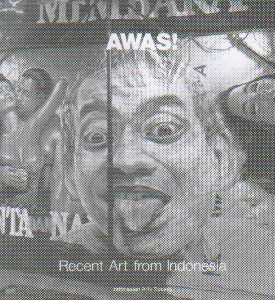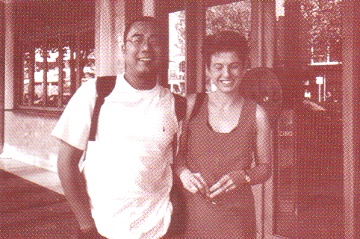Siapa Asialink ?
The Asialink Centre at The University of Melbourne is the largest Australian institute working to educate the Australian community about the countries and cultures of Asia.
The centre's Corporate & Public Programs include:
∑ Lectures and Seminars
∑ Corporate briefings on Asian business culture
∑ Conferences
∑ Scholarships
∑ The Dunlop Asia Leadership Program
∑ The Asialink Circle
Asialink's Asia Education Foundation is at the forefront of bringing studies of Asia into the Australian school curriculum and produces text books, videos and CD Roms. Its teacher education program includes tertiary courses and in-country tours in Asia.
Asialink's Arts Program showcases Australian art and promotes cultural exchange. Since 1991, Asialink has sponsored more than 180 Australian visual and performing artists, arts managers and writers on residencies and toured 46 Australian art exhibitions to 151 Asian venues. To date the Arts Program has worked with 19 countries in the region.Cultural Exchange with Indonesia
New Indonesia-related cultural projects supported by Asialink Arts include a major theatrical production for the Adelaide Festival 2000, a very significant touring exhibition of Indonesian contemporary visual art, residencies including Indonesian writers and Arts Managers as well as the development of a community cultural development exchange program.
"Theft of Sita" steals the show!
"If art has its beginnings in a sense of awe of the world in the enchantment of telling a story, in suspending disbelief and in the magic of human action, then the concoction that director Nigel Jamieson has put together is sheer enchantment.
Jamieson had the felicitous idea of inviting a group of Indonesian musicians and puppeteers to collaborate with composer Paul Grabowsky to create a multicultural puppet show. Puppet master I Made Sidia leads a small group of Australian puppeteers while I Wayan Gde Yudana, who also co-authored the score, leads a mixed ensemble of Balinese and Australian musicians(The Age).
During 1999 Nigel Jamieson travelled to Indonesia on an Asialink Performing Arts Residency and while there used part of his residency to explore Wayang Kulit in Bali. Jamieson was also commissioned by the 2000 Adelaide Festival to create a contemporary adaptation of the Hindu Epic - the Ramayana. The result was "The Theft of Sita" - a fusion of elements of Indonesian and contemporary western music and culture, incorporating the talents of Paul Grabovsky, Balinese Dalang and percussionists, Reg Mombassa as well as British theatre designer, Julian Crouch. Jamieson also worked with Arif Hidayat of Arimba Culture Exchange (AIAA Member), who had been to Indonesia earlier that year on an Asialink Arts Management Residency. Arif became involved in working with the project assisting with artists visitng from Indonesia.
The original Ramayana story has been transformed into an analogy of life in modern day Indonesia. Indonesian "artists have been at the forefront of change, where puppet masters (dalangs) have played a vital role in political commentary, saya Jamieson. "The dalangs would talk every night about the latest political situation (in their performances). The clowns were talking about Suharto. In the reformasi, there were two main focuses for public discussion...one was the dalang and the other was the internet." (SMH)
According to Jamieson, Indonesia has "a growing amount of contemporary arts practice which is dynamic, politically charged and truly exciting. I do believe these kinds of projects can play some part in Australia coming to terms with where its placed in the world ...and a more mature vision of our nearest neighbours."(The Age) "The problems in our relationship are primarily based on ignorance, hubris and pride...for artists to come together and explore those issues and begin a dialogue has to be one of the starting points for a relationship to mend."(SMH) Besides being a watershed of Australia-Indonesia cultural collaboration, according to John Slavin of The Age "The Theft of Sita remains the most original and brilliant production at this year's festival." The production will be presented at the Melbourne International Festival in October this year."Awas!"
'AWAS! Recent Art From Indonesia' opened in Melbourne late last year and is currently touring nationally to rave reviews. Damon Moon, Asialink Visual Arts resident to Indonesia in 1998, was the driving force behind the exhibition, curated with partners Mella Jaarsma (Cemeti Gallery, Yogyakarta) Dwi Marianto(Institut Seni Indonesia) and Alexandra Kuss. It is one of the first major exhibitions of contemporary Indonesian art held in Australia.
AWAS! has been shown at the Australian Centre for Contemporary Art, Melbourne, Canberra School of Art Gallery, Ivan Dougherty Gallery, Sydney, and will now tour to Cairns, Japan and Germany.

Catalogue cover from Awas
Indonesian Art and Community
Asialink and the Community Cultural Development Unit of the Australia Council have been working on a proposal for various potential partners to look at development of two-way projects between community and cultural workers in Indonesia and Australia.
the impetus for this project comes from the importance of cultural activities in the wider community in Indonesia - outside the formal venues of theatres and art galleries - along side the long experience that Australia has developed in community arts infrastructure and practice.Indonesian Internships
A very interesting aspect of Asialink's program is the Indonesian Internships to Australia Program.
The Indonesian Internship Program places three arts managers from Indonesia with arts organisations in Australia during 1999/2000. Each internship is for a period of approximately 4 months, with an extra three weeks available to explore and research organisations in other cities. This program enables a level of reciprocity otherwise impossible given the lack of resources of many Indonesian arts organisations and contributes to building skills and relationships between arts managers and organisations in both countries. It also adds to the overall vision of assisting Australian and Indonesian arts managers to extend their frames of reference, inspiration and opportunities through an exchange of skills, ideas and networks.
The project costs are met by the Ford Foundation in Jakarta and assisted by the Kelola Project in Solo. Australian host organisations involved in placements are:
∑ Carnivale (NSW) - Australia's largest multicultural festival, hosted Jusuf Sugito, Chief of the Secretariat of the Jakarta Arts Council.
∑ Adelaide Festival (SA) - hosting Rifky Effendy, Curator of Galleripadi, Bandung.
∑ Victorian Arts Centre and Gasworks Arts Park (Vic) - will provide placement for Dhani Turner from Gedung Kesenian, Jakarta.

Rifky Effendy with Andrea Kleist at Adelaide Festival
Residencies for Indonesian Writers:
Asialink is pleased to be offering their first reciprocal Literature residency to a writer from Indonesia. Three Indonesians have been shortlisted by the Lontar Foundation: Sitok Srengenge, Dorothea Herliana, and Oka Rusmini. They are all relatively young writers with great potential. Srengenge is a well-known poet and one of the coordinators of the arts program at Teater Utan Kayam in Jakarta, Herliana is a popular and challenging poet and journalist from Semarang, and Rusmini is a journalist and fiction writer from Bali with a feminist edge to her work. A final decision will be announced in the next few weeks on the Asialink website.
Australian Residencies in Indonesia
Grisha Dolgopolov
Grisha Dolgopolov is a first generation Russian-Australian who works in cross-cultural performance and research, exploring the hybrid combinations of Russian, Aboriginal and non-Aboriginal Australian and Asian cultures. His productions 'Vibes' and 'Black Russians' are examples of his collaborations with Malaysian and Balinese, Russian and Aboriginal art forms respectively. During his residency, Dolgopolov will work with STSI, Bandung.
Megan Kirwan-Ward
Megan Kirwan-Ward is a textiles based craftsperson and arts administrator born in Perth. She collaborated with textile workers in Padang, Sumatra some years ago and intends to build on this connection during a longer term visit there as a resident at the Institute Ikap Padang. She was also recently involved in running ARX, an international artists residency program between Hong Kong, Singapore and Perth. Kirwan-Wardís recent work has concentrated on sculptural furnishings and she is interested in drawing from traditional and contemporary dye, stitch and print techniques to create new production works.
Simon Wellington
Simon Wellington is the General Manager of the Salamanca Theatre Company, Tasmania. He has experience in the areas of venue and events co-ordination including managing Salamancaís Youth Theatre wing Ďsytí, was the Tasmanian facilitator for the Australia Councilís Youth Arts Framework and initiated the Tasmanian Youth Arts Development Strategy. In Indonesia Wellington will work with the Jakarta Arts Centre on the Jakarta International Arts Festival, concentrating on the areas of audience development and youth arts.
Wendy McPhee
Wendy McPhee has worked with national and international dance companies, including Mantis, one of Britainís most avant-garde contemporary dance companies, and Tasdance. In 1995 she formed Two Turns, a highly successful collective of independent artists. McPhee is President of Ausdance Tasmania and the dance events co-ordinator for the 1999 Hobart Fringe Festival. During her residency in 1999, McPhee was based at the Institut Seni Indonesia in Yogyakarta and, due to a shift in timetables owing to recent events, she will be completing the residency in September/October 2000.
For more information on the Asialink Centre check out our website on http://www.asialink.unimelb.edu.au or contact us at:
The Asialink Centre
Ph: (61 3) 9349 1899 Fax: (61 3) 9347 1768
11-13 Lincoln Square South
Carlton Victoria 3053
AUSTRALIA
Email: enquiries@asialink.unimelb.edu.au
Asialink is supported by the Australia Indonesia Institute and the Australia Council